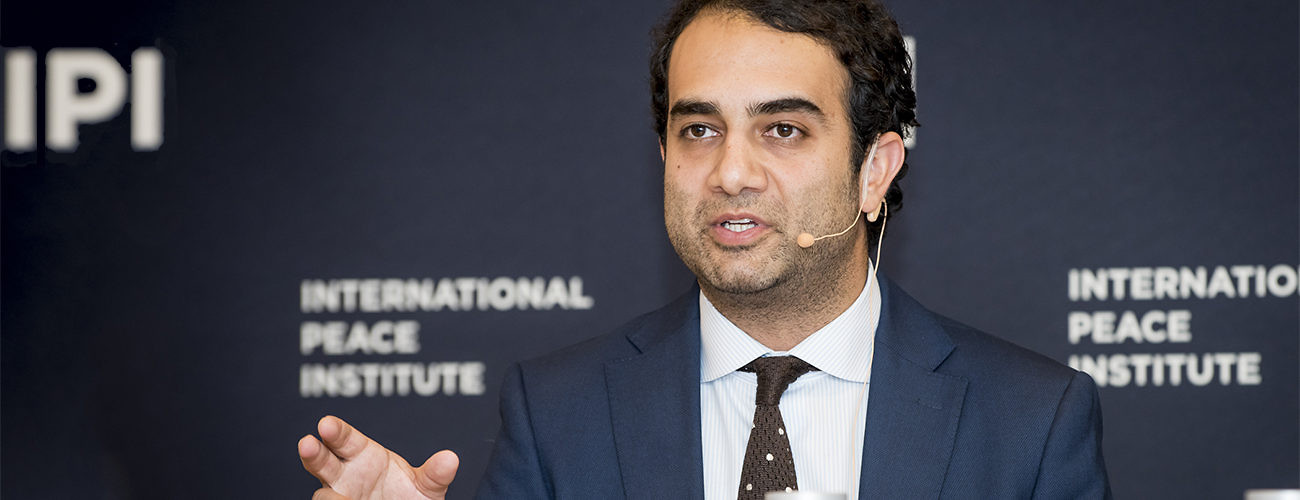“I am arguing that Islam is fundamentally different from other religions, that it is exceptional,” said scholar and author Shadi Hamid, explaining the title of his new book Islamic Exceptionalism: How the Struggle Over Islam Is Reshaping the World to a November 1st IPI Distinguished Author Series event.
“Islam is exceptional in a particular set of ways that have a profound impact on modern politics, 14 centuries after the founding of the religion,” he said. “That’s in Islam’s relation to law, politics, and governance. Historically, Islam has proven to be resistant to secularization, and I would argue that it will continue to be resistant for a long time to come.”
The struggle, he said, picking up another aspect of his book’s title, is one between religion and politics, which are more intertwined than they are in Christian secular societies.
“I would argue that at the center of that struggle are a set of unresolved questions about Islam’s relationship to the state, the role of religion in everyday life,” he said. “Should the state be ideologically or religiously neutral, or should the state promote a particular conception of the good life, of the virtuous life? Nearly a hundred years after the fall of the caliphate, these unresolved questions remain unresolved. So that’s part of what’s fueling many of the conflicts we’re seeing today. ISIS to me is the latest iteration of this ongoing struggle.”
He said one option going forward was to “hope that Muslims just get over their ‘thing’ with religion. They go through a reformation, then enlightenment, then secularization… Because, you know, Christian Europe went through it. They got over these religious obsessions, so why can’t everyone else do that? But that assumes that Islam would follow the same trajectory as Christianity”- an outcome he said was unlikely.
He said that in his studies, he had come to appreciate the power of religion.
“I’m trained as a political scientist,” he said. Political scientists, as you might know, like things to be tangible and measurable. So when we talk about why people join Islamist movements, or the causal factors that lead to extremism, we talk about underemployment, unemployment, poverty, being angry at the US, rural/urban migration, all of these factors, right? But we’re often uncomfortable talking about religion as a prime mover. It’s not the only motivator, but it’s a very important motivator.”
In his research, Mr. Hamid conducted hundreds of interviews in the Middle East, and he mentioned one in particular with a mid-level official of the Muslim Brotherhood. “We were talking about why people join the Muslim Brotherhood, and he said, ‘Shadi, sometimes it’s quite simple. Sometimes people join the Brotherhood because they want to get into heaven.’
“That particular way of putting it has really stayed with me,” he continued, “For those of us who come from a secular background, sometimes it’s hard to relate to this idea that people just want to get into heaven… that sort of goes against this idea that people do things for rational reasons. But if you look at it from the standpoint of a believer, what could be more rational than wanting eternal paradise?”
Mr. Hamid stressed that Islam’s unique relationship to law and politics limits room for common ground between Islamists and non-Islamists over religion’s role in governance.
“There are Muslim secular reformers today who argue for some separation of religion from politics,” he said. “But they face an uphill battle because they have to argue against the prophetic model of intertwining religious and political functions. And that’s why many of these secular reformers haven’t gained traction in the Middle East and beyond.”
Notwithstanding the long history of bitter rivalry between secular Muslims and Islamists in the Middle East, Mr. Hamid did not rule out the potential for peaceful, if divided, coexistence.
“The challenge is coming to terms with Islam’s place in public life,” he said. “If Islamists and non-Islamists hate each other, for legitimate reasons, the question is how do they learn to live with each other despite that hatred. My hope is a modest one, that people will continue to hate each other, but they’ll agree to hate each other within a peaceful political process.”
He was asked if he thought Syria and Iraq would survive the current convulsions in their societies and emerge at the end as nation states still. “No,” he answered, “because history happened already. The last five years happened.
“So you might still have Syria in some sense, but you will have areas that are predominantly Sunni, predominantly Alawite, and they’re going to be living in their own geographic area. They might maintain the fiction of Syria, just like Iraqis have maintained the fiction of Iraq. That’s better than nothing because at least there’s still something called ‘Iraq’.”








